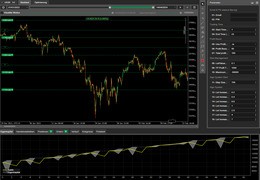Between reality and illusion If you want to know what trading really means—beyond luxury cars, piles of cash, and...
Search in blog
Blog categories
- FAQ – Your guide through the world of finance and technical facilities (2) click
- Daytrading Almanac (27) click
- Press release (23)
- Educational (26) click
- Projects (9)
- Chart analysis (39) click
- Trading bots for cTrader (11)
- AI in trading (5)
- Trading Strategien (11)
- Trading signals and stock market letters (46)
Latest posts

When it comes to traders, social media platforms often create a rather one-sided image: a young face smiling at the...

The TegasFX Instant Funding program sets a new standard for traders seeking quick access to capital without having to...

Backtesting trading strategies is an essential tool for traders who want to validate their methods across historical...

introduction In the world of trading, it can be challenging to balance the intense market activity and the rapid...
Popular posts





Featured posts





Photo gallery
No featured images
Archived posts
Top authors
-
 Christian Lill 70 Posts View posts
Christian Lill 70 Posts View posts -

-

-

-

Best Practices for Using Demo Accounts: The Key to Effective Trading Training
1. Realistic simulation
Why is this important? To get the most out of a demo account, traders should use it as if it were their real trading account. A realistic simulation helps develop effective trading habits.
Best Practices:
-
Adjust account size: Choose an account size that realistically matches your planned capital for live trading. This ensures that the trading strategies are also feasible on an actual account.
-
Risk Settings: Set the same risk settings you would use in live trading, such as leverage and margin usage.
-
Maintain discipline: Treat the demo account with the same discipline and seriousness that you would treat a real account. This will help develop a professional trading mentality.
Advantages:
-
Creates a realistic trading experience
-
Helps develop disciplined trading habits
-
Better prepares for real psychological pressure
2. Developing and testing trading strategies
Why is this important? A demo account provides the ideal environment to develop and test trading strategies without taking any financial risks.
Best Practices:
-
Strategy development: Develop clear trading rules that include entry and exit points, risk management, and profit targets. This structure facilitates consistent trading.
-
Backtesting: Use historical market data to test your strategies in different market environments. This shows how the strategy has performed in the past and where adjustments are needed.
-
Iterative improvement: Regularly adjust your strategy based on backtest results and changing market dynamics.
Advantages:
-
Evaluates the effectiveness of a strategy before investing real capital
-
Allows testing of strategy adjustments without risk
-
Promotes confidence in the chosen trading strategy
3. Observe and analyze
Why is this important? Continuous learning from trading experiences promotes improvement of skills and understanding of the markets.
Best Practices:
-
Keep a trading journal: Document every trade, including the reasons behind your decisions, emotions, and the results. This helps identify patterns and behaviors that can be improved.
-
Regular Review: Sit down regularly to evaluate your trading activities and strategies. Analyze what is working well and what is not.
-
Error analysis: Examine your errors and losses to understand why they occurred and develop plans to prevent them.
Advantages:
-
Promotes self-reflection and continuous learning
-
Improves decision making through hindsight analysis
-
Helps to recognize and correct emotional patterns and errors
4. Improve emotional control
Why is this important? Emotions can significantly affect trading. Practicing emotional control in the demo account will better prepare you for live trading.
Best Practices:
-
Stress management techniques: Develop stress management techniques such as mindfulness, meditation, or taking regular breaks to keep a clear head.
-
Practice discipline: Strictly stick to your trading plan and avoid impulsive decisions. This promotes the development of a disciplined trading style.
-
Be patient: Learn to be patient and not react to every short-term market movement. The market is constantly offering new opportunities.
Advantages:
-
Prepares for the psychological pressure of live trading
-
Promotes rational and disciplined trading
-
Reduces emotional decisions and their potential negative effects
5. Preparing for the transition to live trading
Why is this important? Moving from a demo account to a live account requires additional planning and adjustment as real capital and psychological pressure come into play.
Best Practices:
-
Start small: Start with small positions in live trading to get used to the psychological differences. This will help manage risk and ease the learning curve.
-
Maintain continuity: Implement the strategies and disciplines that have proven successful in the demo account. Avoid making drastic changes due to emotions or uncertainty.
-
Gradual Risk: Increase risk gradually as you become more comfortable with live trading and gain confidence.
Advantages:
-
Gentle adaptation to the challenges of live trading
-
Increases trust and reduces uncertainty when dealing with real capital
-
Promotes long-term growth and success in trading
Conclusion
Demo accounts are a valuable tool for learning and practicing trading skills. By following these best practices, traders can optimize the learning process and effectively prepare for live trading. By using realistic simulations, developing strategies, controlling emotions, and carefully planning the transition, traders can significantly improve their chances of success.
discussion stimulus
What best practices have helped you when using demo accounts? Do you have any tips or experiences that could be useful to other traders? Share your thoughts and experiences in the comments and let's learn together!
I hope this more in-depth article provides some deep insights into how to use demo accounts effectively. Let me know if you would like more information on this topic or would like to explore another topic!
Leave a comment
Related posts
 Case study: Automated trading (bot trading) and its impact on retail investors’ leisure activities
Case study: Automated trading (bot trading) and its impact on retail investors’ leisure activities
 Tradingbot vs. Tradingcoach
Tradingbot vs. Tradingcoach
 AI FAE think tank
AI FAE think tank
 AI STOCK SCREENING OF THE WEEK ON 04/26/2024
AI STOCK SCREENING OF THE WEEK ON 04/26/2024
